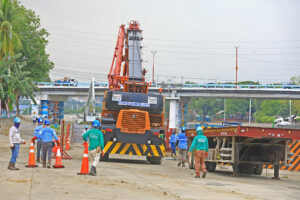THE Department of Budget and Management (DBM) said a law banning temporary restraining orders (TROs) against infrastructure projects has established a legal principle that can be applied more broadly to a blanket TRO ban on all procurement exercises.
Republic Act (RA) 8975, formally known as “An Act to Ensure the Expeditious Implementation and Completion of Government Infrastructure Projects by Prohibiting Lower Courts From Issuing Temporary Restraining Orders, Preliminary Injunctions, or Preliminary Mandatory Injunctions, Providing Penalties for Violations Thereof, and for Other Purposes,” can be applied to the procurement system in general, and not just to infrastructure projects, DBM Procurement Service (PS) Executive Director Dennis S. Santiago said in a Viber message.
The DBM is seeking “to apply the same legal principle in RA 8975 to procurement of goods and services, including consulting services, to address delays in government procurement, achieve early completion of projects, and deliver goods and services on time. Under the proposal, (only) the Supreme Court would have the jurisdiction to issue (a TRO),” he added.
The DBM is in the process of completing the proposed amendments to the Government Procurement Reform Act of 2007 for submission to Congress.
In his second State of the Nation Address, President Ferdinand R. Marcos, Jr. called for reforms to the procurement law “to make government procurement more attuned to these changing times.”
The broadening of the TRO ban will “tackle possible delays in the procurement process because of suits filed by losing bidders,” according to the DBM.
Another proposed amendment by the DBM is to apply a no-bid process for goods and services worth around P250,000 or possibly less.
Mr. Santiago said that the threshold for no-bid procurement has yet to be determined. “The P250,000 figure is a proposal. The amount can be P50,000 or lower,” he added.
“The ‘direct acquisition’ procurement modality is being proposed to enhance efficiency and timeliness in the procurement of goods that are essential and necessary in the proper conduct and performance of government agencies’ functions and responsibilities,” he added.
Mr. Santiago said the amendments aim to “fulfill the needs and demands of the agency within the time frame without having to go through the entire bidding process for procurement of goods of low value.”
“As you may know, the bidding process takes some time, and there are also externalities that contribute to delays in government acquisition,” he added.
Budget Secretary Amenah F. Pangandaman has said that procurement issues have had an “adverse impact” on public service delivery.
“Of our total National Government budget, up to 25% is (used on) procurement. These are the reasons that this reform has become necessary, tedious as the process may be,” she added.
The reform of procurement law also aims to help government agencies accelerate spending. — Luisa Maria Jacinta C. Jocson

